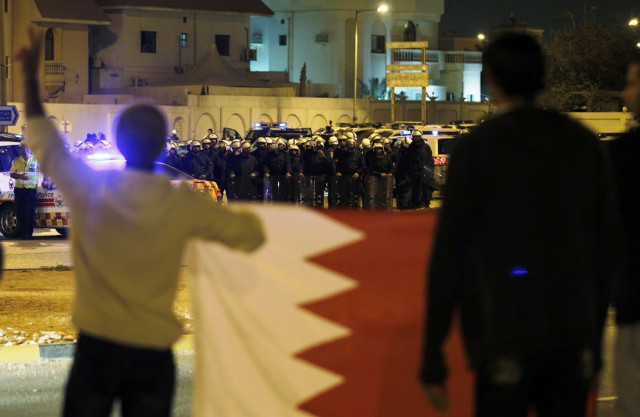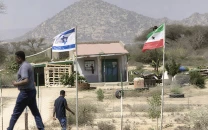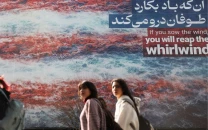Several hurt as Sunnis, Shiites clash in Bahrain
Sunni and Shiite Muslims clash in first direct confrontation since protests erupted two weeks ago.

Several hurt as Sunnis, Shiites clash in Bahrain
The overnight clashes were triggered by a family dispute or a car accident, or both, according to different accounts, although the government said the cause of the dispute was "simple".
"There were about a hundred people involved," one resident said as police helicopters circled overhead and ambulances rushed from the scene.
Youths with sticks and batons fled the area, residents said.
The island kingdom has been gripped by unrest since protesters, formed mainly of disgruntled majority Shiite Muslims, took to the streets demanding democratic reforms in the US-allied Sunni monarchy.
Seven people died after police and the army tried to disperse the protests when they erupted two weeks ago, but since there had been no more violence since the government has ordered police forces and troops off the streets under international pressure and promised to start talks.
Friday's fighting came hours after Bahraini opposition groups said they were ready to enter into talks with the government without pre-conditions, but have sent a letter to the crown prince saying they want a new government and constitution.
Hamad residents said a group of Shiites fought with a group of Sunnis and Bahrainis of Syrian extraction. Only half of Bahrain's population of 1.2 million are native Bahrainis.
Fighting died down when police forces arrived and fired some teargas to disperse crowds, the residents said. Later there was a standoff between riot police and groups of Shiites who rushed to the area from other parts of Bahrain.
"One man fell down and a large group came and beat him. There's still groups with sticks everywhere but fighting has largely stopped," a witness told Reuters.
Ibrahim Mattar, who is part of a team at Bahrain's main Shiite opposition group Wefaq gathering information on violent incidents in Bahrain said he estimated the number of injured at about six.
Popular revolts sweeping across the Arab world over the past two months have toppled the leaders of Tunisia and Egypt, inspired protests some Gulf countries and triggered an outright rebellion in Libya.
Sparked
The Ministry of Interior said in a statement that it took police about two hours to get the situation under control, with the help of local politicians and high-ranking government officials who calmed residents.
"The cause of the quarrel was simple and occured among a small group, but the speed of the information flow and the interaction of people forced us to intervene," Interior Minister Sheikh Rashed bin Abdullah al-Khalifa said in a statement.
Pro-government media said clashes erupted after a traffic accident. Both parties then called their relatives to the scene who started clashing.
"I heard many different versions," said Mattar. "I think there could have been a dispute between families in that area about something unrelated, not sectarian."
Others said that Shiite youth had targeted naturalised Sunnis living in the area. Hamad Town is a small city in the centre of Bahrain, where Shiites and Sunnis live together, including those that were granted Bahraini citizenship.
The naturalisation of Sunni Arabs and Pakistanis serving in Bahrain's security forces is a major bone of contention for Bahrain's Shiite opposition.
It has long demanded an end to the practice of granting citizenship to Sunni foreigners, which it sees as an attempt by the government to change the country's demographic composition.
The government denies there are such plans and says all naturalisation is done in full transparency and in accordance with the kingdom's immigration laws.
Bahrain's king said in December that the island kingdom would limit the number of foreigners that are granted citizenship, in what observers said was the first official acknowledgement of the practice and a gesture to the opposition.



















COMMENTS
Comments are moderated and generally will be posted if they are on-topic and not abusive.
For more information, please see our Comments FAQ